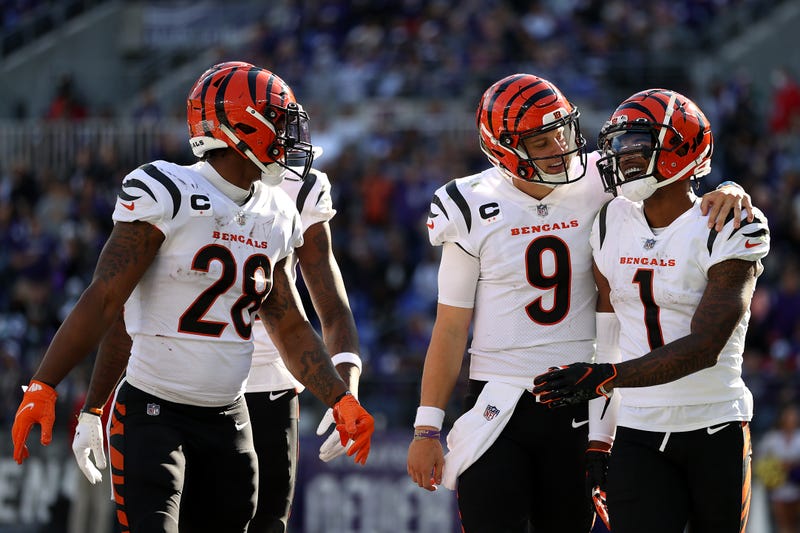
We have a propensity these days to fast forward sports. What used to be analyzed after an entire career is now done nightly. We question LeBron's legacy if he wins "this" NBA Finals. We ask how history will view Aaron Rodgers after losing "this" playoff game. We debated whether Patrick Mahomes can catch Tom Brady's Lombardi Trophies, 15 years from now.
We're a society in double time, like listening to podcasts at 1.5x speed. Why wait years before making bold proclamations? There's no fun in patience. So it's of the zeitgeist right now to loudly and assuredly declare the Bengals a budding dynasty if they win Super Bowl 56. Joe Burrow would become a legend with a victory. Yet, a loss could render Cincinnati a one-year wonder, and Burrow a modern-day Dan Marino, losing the Super Bowl in his second season, never to return.

Of course, we know all of this is melodramatic, even if Instagram commenters keep pouring it on. But perhaps there's something historically afoot here for the Bengals: the element of surprise. When dynasties do happen, we often don't see it coming. The most recent NFL regime of power was the Patriots, from 2001-2018, which resulted in six Super Bowl titles and an absurd nine trips to the Big Game. It all seems so predictable now. Pair Tom Brady with Bill Belichick, and watch the domination unfold.
But back in 2000, suggesting the Pats would even win one title was pure fantasy. Belichick's first season at the helm was a 5-11 slog, which began 0-4 in September. Their ruthless defense became the best in football and helped lift the Pats to three Super Bowls in four years. It wasn't enough in 1999 and 2000, though. No one, including Brady, could've ever foreseen the march to a title the following year, under inspired play from a sixth-round sophomore QB. But the stars aligned in 2001, and the match had been lit on a dynasty.
Even after an AFC East division title, who could've seen the dominos fall? In a torrid snowstorm Brady's arm was ruled going forward, the Tuck Rule deemed that ball not a fumble, and Adam Vinatieri drilled one of the most difficult kicks in NFL history. The next week, the Pats were 10-point dogs in Pittsburgh, and shocked the world again. The AFC championship featured a punt return and blocked field goal for Patriots touchdowns, a massive 14 points in a 24-17 win.
The oddsmakers installed New England as 14-point Super Bowl underdogs against the Greatest Show on Turf, featuring at least four Hall of Famers on offense. St. Louis had put up 74 points in its previous two playoff games. The Pats bamboozled them, got a pick-six from Ty Law, and held the Rams to just 17 points in one of the greatest defensive performances in league history.
The beginning of the Patriots' dynasty was completely impossible to imagine at the time. Good breaks, defensive scores, and some poor coaching by the opponent (Mike Martz's scheme was head-scratching) helped fuel their run. Only in retrospect, with the knowledge of what those participants became, does it seem logical.
The same can be said about a dynasty born 20 years earlier, when bizarrely, Brady was in the stands. A young Tom watched 49ers legend Joe Montana hit Dwight Clark in the back of the end zone, shocking the Cowboys in the NFC title game. Dallas was still churning as a 1970s powerhouse by the start of the 1980s. The Cowboys had won double-digit games for seven straight seasons, played in five Super Bowls in the decade, and become America's Team. The Niners, however, were the complete opposite.
San Francisco had losing seasons in seven of the previous eight years, and had won 10 total games from 1978-1980. Yet, in 1981, they went 13-3, the best record in the NFL. Despite their regular season dominance, they were still an underdog to the Cowboys at home in the NFC title game. Montana's lethal strike to Clark capsized the Cowboys' dynasty and launched a new one. The Niners would win Super Bowl 24, then three more under Montana, crowning them Team of the Decade.
Montana was a slightly-built, third-round draft pick benched multiple times at Notre Dame. Bill Walsh had won only eight games in his NFL coaching career before 1981. Success appears so obvious now, but at the moment, the 49ers' championship run felt like a fluke. Especially when they missed the playoffs the next year.
There are examples of NFL dynasties that were built slower and more methodically, The Steelers of the 1970s lost in consecutive playoffs before winning their first Super Bowl in 1974. The Cowboys of the 1990s went from one win, to seven, to 11, to 13, when they ultimately broke through for a ring in 1992. But sometimes, reigns of dominance seem to drop out of the sky. The Bengals are farther along than anyone could've expected at an extremely early juncture.
Burrow has a composure beyond his years. Ja'Marr Chase looks like one of the best receivers in football for the next decade. The Bengals' front office spent plenty of cash last offseason. But, as we've seen, even the greatest teams need breaks too. To get here, Cincinnati got a touchdown on a play that should've been called dead, three picks from Ryan Tannehill, and the Chiefs inexplicably botching the end of the first half. Coming off a four-win season, a Bengals win on Sunday would be one of the most shocking in league history. But years down the road, maybe we look back and wonder why we didn't see it coming.
